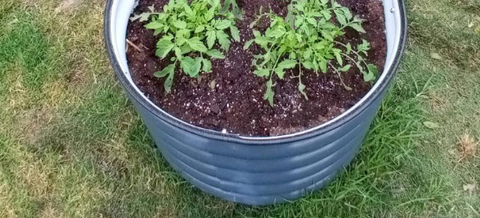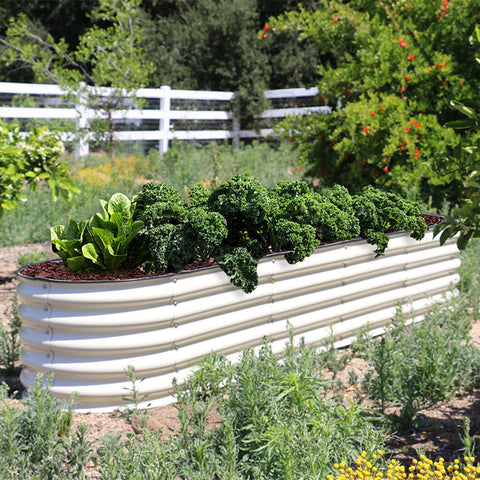Tips from Olle Garden Bed: Day of Ditch Composting
One of the easiest ways to still compost in winter is to use a method called trench composting - even if you don't have a compost heap or trash can! The following content also has some reference value for raised garden beds.
Ditch composting is one of the oldest tried and tested methods of enrichment and returning power to the soil. In fact, almost every civilization that dates back thousands of years uses it. Interestingly, it still works wonders today. Especially for those who are trying to find composting methods in winter.
Trench composting is the practice of burying compostable materials directly into the soil. Instead of creating compost heaps and adding and mixing ingredients, waste and other compostable materials are buried directly in the soil of gardens or flower beds.

For people, this is a good way to reactivate their soil.
Once in the soil, the materials will decompose over time and then bring their nutrients back. Ancient civilizations used this method to help provide energy for crops.
They bury everything from seaweed to old fruits, vegetables and even fish residues in the soil. It not only enriches the soil of future crops, but also eliminates any smell or smell in decaying materials.
Winter Composting – How to Use the Trench Method
Today, most avid gardeners use dedicated compost piles instead of ditches for composting. It allows materials to be completely decomposed over time, enabling them to obtain pure and rich finished compost for addition to planting holes, potted soil, etc.
But even those with compost piles can still benefit from ditch composting. Especially with the arrival of cold winter and freezing temperature. The fact is that many composters are trying to make their compost survive the winter.
With the stabilization of cold temperature, decomposition will slow down or even stop in some cases. Piles may also freeze, be covered with snow, or be overloaded because the material is not decomposed. If the materials do not decompose and the temperature rises, they can even begin to smell.
Unfortunately, when this happens, many gardeners stop composting together. Instead of using all these valuable vegetable skins, residues, coffee grounds, etc., they simply throw them away.
Fortunately, this is where ditch compost can save the day! With a little effort, all these valuable materials can help you easily power the soil.
Several Methods of Practicing Trench Composting
So, how does ditch composting work in winter? Well, it all depends on how harsh your winter is and how often and when your ground freezes. But make no mistake, no matter where you live, ditch compost can work for you!
Ditch Composting in Warm Winter Climate
If you live in warm or temperate areas in winter, it is quite easy to dig up unfrozen soil. Although the colder winter temperature may be cold enough to slow down conventional composting, it will not affect ditch composting at all. By burying the material, there is no need to worry about smell or smell!
First select an area of the garden or flower bed, then dig a hole about 10 to 12 inches deep. Next, place the waste directly in the hole, leaving enough space at the top to cover the hole with at least 4 inches of soil.
By burying to this depth, the soil remains warm and helps to decompose the material more quickly. But more importantly, it is also deep enough that rodents and other animals will not dig it back.
If you do this within a foot or two of a perennial plant or shrub in a flower bed, it will slowly provide nutrients as the material decomposes. You can also dig holes or ditches in the garden, which will decompose to help the soil and plants in the next year.
Cold weather trench composting
So, what if the ground in your area often freezes, or freezes for several months at a time? never mind! In fact, there are two different ways to still dig ditches and compost.
One of the easiest ways to dig ditches and compost in winter in cold regions is to place a 5-gallon bucket near the outdoors with a tight lid. Fill the bucket with kitchen residues, coffee grounds, etc.
The good news is that when the outdoor temperature becomes so cold, the compost material will not cause any odor problems or rot in the bucket.
They can simply remain until they are warm enough to break through the soil and bury it. It's better than throwing it on a cold compost pile and letting the animals rummage through it. Or worse, the pile began to rot and stink.
If you happen to live in a climate with absolutely cold temperatures, you can create your holes or several holes in autumn when the soil is still viable. Cover the hole with a board, then lift and lower the material as needed, and replace the cover.
Once it gets warm enough to cover a little soil and fill the hole, your ditch compost will start to decompose. Again, this is a better way than simply throwing away all these valuable kitchen debris!
Ditch composting in spring, summer and autumn growing seasons
Whether you have a compost pile or not, you can also use the power of ditch composting during the growing season. In fact, this is a good way to side load your plants to help them provide them with nutrients and minerals that are slowly released.
Eggshells, coffee grounds and vegetable residues are very suitable for trench composting with side trimming method. Start by digging four to six inches from the edge of the root of a vegetable or flower plant.
Because the soil is warm, you don't need to dig as deep as in winter. Once the material enters the ditch, just cover it with soil to make magic happen. When materials decompose, they slowly and naturally provide additional nutrients for plants.

Trench Compost All Star for Side Application
Coffee grounds provide trace amounts of nitrogen and other nutrients to the soil and nearby plants. In addition, they help to retain moisture and increase the overall soil structure when decomposed.
Another good side dish ingredient is crushed eggshells. They are ideal for ditch composting around tomato and pepper plants. When shells decompose, they will use calcium to enrich the soil. Calcium is the key mineral to prevent tomatoes and peppers from rotting at the flowering end
Vegetable residues such as potato and carrot peel are another good choice. They decompose rapidly in the soil to provide additional nutrients and help add organic matter to the soil. This is the value of ditch compost in winter, or any time!
